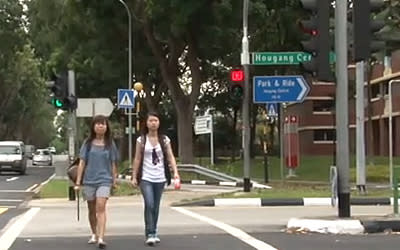‘PM Lee, I don’t get upgrading, so can I pay less tax?’

An engineering student living in Hougang Single-Member Constituency (SMC) ward posed a candid question to Prime Minister Lee Hsien Loong on whether he could pay less tax since the opposition-held ward does not enjoy upgrading programmes.
At the Kent Ridge Ministerial Forum organised by the National University of Singapore (NUS) Students' Political Association on Tuesday, fourth-year engineering student Seah Yin Hwa, 25, asked PM Lee why residents living in Hougang SMC are penalised for picking "a 'Teochew nang' (dialect for Teochew person) who doesn't wear a white uniform."
When asked by PM Lee on how he was penalised, Seah said, "When it comes to upgrading, what is being told to us is that we don't have the funds to actually go ahead with lift upgrading, as well as shelters to the bus stops. When I look across the road to Aljunied GRC, they have everything."
Paraphrasing the question posed, PM Lee said that what Mr Seah meant is why the opposition wards are not treated at least as good, or maybe even better than the PAP wards.
PM Lee added, "And the answer is that there has to be a distinction. Because the PAP wards supported the Government and the policies which delivered these good things."
He said that while the basic goods such roads, transportation, housing, healthcare and defence apply to Singaporeans, the extras — which come down to the upgrading programmes — is a national programme.
"Between the people who voted and supported the programme and the government, and the people who didn't, I think if we went and put yours before the PAP constituencies, it would be an injustice," PM Lee told the 1,200 students at the forum.
In response to PM Lee, Seah cheekily asked if he could pay less tax and maybe "take one or two years off my NS?", which drew laughter and applause from the audience.
But PM Lee said that this is not possible because the SAF, defence, taxes and all the facilities which have been provided, are enjoyed by every Singaporean.
Rounding off his reply, PM Lee said, "But you can do something about it, you know. You don't have to keep voting for people not in white-on-white."
PM Lee explains ministerial salaries
The contentious issue on ministerial salaries was also discussed at the forum after a Nanyang Technological University (NTU) accountancy student brought it up, comparing the salaries of leaders from Singapore and the United States.
"The US president is actually paid less than a Cabinet minister in Singapore. I'm sure we agree his job is a lot tougher than our Cabinet ministers," said the student.
In his response, PM Lee said that US President Barack Obama may be earning less than a Singaporean minister, but the American system is not without its flaws.
For example, he highlighted that the US had different ways of rewarding its presidents and that the low salary of the president had suppressed salaries down the line, reported The Straits Times.
Explaining his first point, PM Lee said that former US presidents are involved in money-spinning book and lecture tours which are almost a tradition for them.
"Retired US presidents go on book tours, they write books, they are paid US$10 million (S$13 million) advance, they get somebody to help them write a tome and they make a lecture tour…Every lecture (by former president) Bill Clinton: US$100,000 to US$200,000 for half an hour.
"That's the system. I think that's not a good system for us. We don't want ministers to retire and go on lecture tours."
Touching on his second point, PM Lee discussed the impact that the low salary of US presidents had on the rest of the civil service.
"Because the president's pay being set at a level which is not quite right, all the rest of the civil service and government pay in the US system has to take dressing from there and come down…and come down," he said.
PM Lee also stressed that Singapore's ministerial pay system was one that works.
But when asked if salaries should still be pegged to the private sector given the many candidates taken from the civil service and unions, he replied, "The reason I can get good people from the Government and the unions is that I have a pay system which is working properly.
"People do not enter politics to get rich but neither will they enter politics and as a result, they and their family will become poor."
He added, "It is something which is not easy to accept emotionally but is the right thing for Singapore. If you want the system to work for the long term, you must be honest about it. What do I pay for? I pay for the importance of the job and how difficult it is to do…"

